🛑 Stop Guessing & Take Action Today!—Limited seats to ensure personalised attention! 👉 Learn More.
How Do You Know When to Cite And When Not to Cite a Source?
Know when to cite and when not to cite sources in content writing. See examples of when to use direct quotes, paraphrased text, and specific data.
By Moses Attamah
11/1/20246 min read
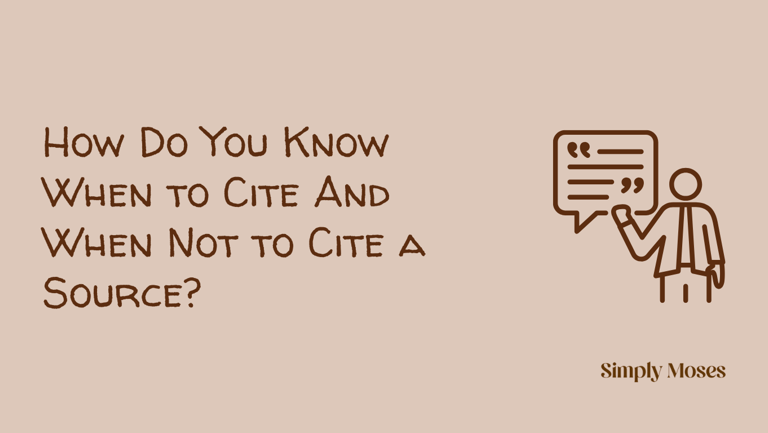

In this post, I’ll show you (with examples) when to cite and when not to cite your sources in content writing.
KEY TAKEAWAYS
Content writing is a strategy businesses use to attract, engage, and retain their customers online.
Learning content writing can give you job opportunities, a steady income, and a chance to grow.
This guide provides practical steps to start writing content, including understanding the basics and choosing a niche.
What is a citation?
The University of Southern California (USC) clearly explains that a citation refers to:
“A source of information that supports a factual statement, proposition, argument, or assertion or any quoted text obtained from a book, article, website, or any other type of material.”
In content writing, citing the sources of your facts helps your audience:
Understand the context of your writing
Trust that your content is accurate
And that it’s based on credible research from an authoritative place.
Why is it important to cite your sources?
Citing sources is important because it:
Gives credit to the sources of the ideas
Supports your claims
And prevents plagiarism.
While citation is important, not all sources require citation.
But how do you know when to cite and when not to cite your sources?
Don’t worry. I’ll show you.
When to cite your sources
Here are 3 instances where you must credit your sources:
#1. When you use someone else’s exact words
#2. When you paraphrase
#3. When you use specific information.
1. When you use someone else’s exact words
When you use someone else’s exact words, quote the person directly.
Quoting the source directly gives proper credit to the original author and prevents plagiarism.
Plagiarism is stealing and presenting someone else’s ideas as your own.
Here’s an example from a blog post by James Clear, where he directly quotes the British cycling coach, Dave Brailsford:
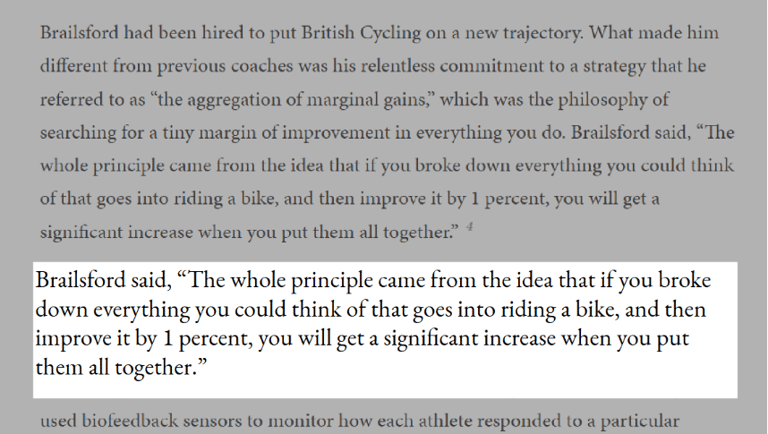

This shows the use of a direct quote with proper credit.
Now, check this out:
If James used Brailsford’s exact wording in his article without citing Brailsford, it would appear that James is the originator of that idea.
That would be misleading.
2. When you paraphrase
Don’t assume an idea is yours simply because you’ve paraphrased it.
If you put someone else’s ideas in your own words, acknowledge the source.
Yes!
Even though you’re not using their exact words, you’re still copying their intellectual property.
Example:
Here’s some original text from the Content Marketing Institute:
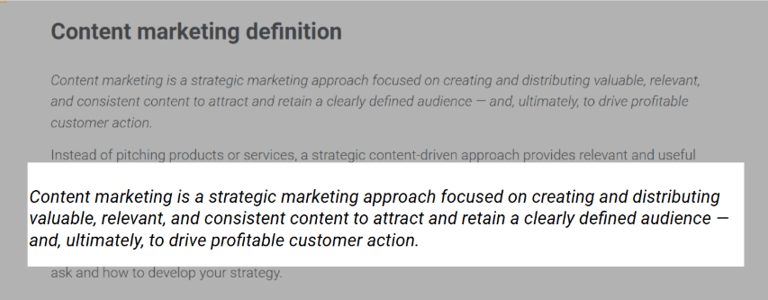

Here’s the paraphrased text:
According to the Content Marketing Institute, content marketing involves consistently creating and sharing helpful, high-quality content. The goal is to attract and engage a specific target audience and get them to buy your products.
Or
Content marketing involves consistently creating and sharing helpful, high-quality content. The goal is to attract and engage a specific target audience and get them to buy your products (Content Marketing Institute).
In this paraphrased version, I have changed the words. But the idea comes from the Content Marketing Institute (CMI).
If I didn’t cite the CMI, it would look like the insight came from me.
(Note that I still hyperlinked the source.)
3. When you use specific information
When you use data, statistics, or other specific facts (e.g., historical or scientific facts) not commonly known, cite the source.
Examples:
I. Data and statistics
Imagine you’re writing about AI usage in content marketing and using statistics to show the positive impact of AI on returns on investment (ROI).
If you mention that “Marketers who use AI see an average of 70% increase in ROI,” cite the source of that statistic.
Here’s a screenshot of this citation from Semrush’s blog post:


As you can see, Semrush has cited and hyperlinked Kibo Commerce as the source of the stat.
II. Scientific studies
When using a scientific study in your writing, always cite it.
Here’s an example from an article on the National Library of Medicine website:
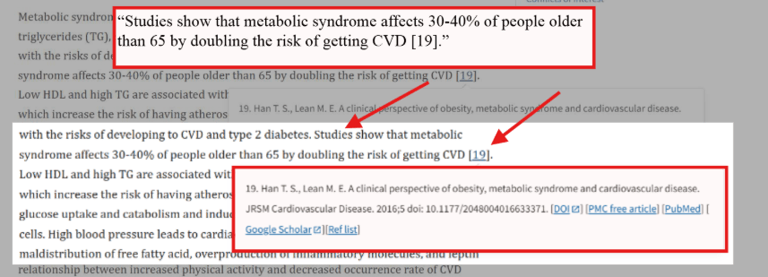

You can see how the writer has cited the above study.
Meanwhile, since the writer included the source as an endnote in the text (indicated with the number “19”), the full source appears in the reference list at the end of the article.
Here’s the screenshot of the source in the reference list:
Endnotes are notes placed at the end of your text in academic writing.
They’re used to provide extra information, citations, or commentary on specific parts of your article.
Finally, crediting your sources properly helps your audience:
Verify the accuracy of the information
And trust the ideas you’re sharing.
Now, let’s talk about the sources you shouldn’t bother citing.

When not to cite sources
Don’t bother citing the following:
Common knowledge
Your original ideas
Folk wisdom or sayings.
Let me break them down.
1. Common knowledge
General or common knowledge doesn’t require a citation.
The reason for this is simple:
Most people know the information and can verify it without consulting any specific source.
Picture this:
You’re writing a blog post about wardrobe essentials for Nigerian women, and you mention that “Nigeria is located in West Africa.”
You have no reason to cite that because:
It’s a basic geographical fact.
Most people know it or can easily confirm it.
Common knowledge includes information from many sources, which the average person within your audience should know.
Examples of common knowledge include facts like:
“Water freezes at 0°C.”
“Paris is the capital of France.”
“Red is a primary colour.”
2. Your original ideas
Your original ideas are your thoughts, opinions, or conclusions.
They come from your personal:
Experience
Analysis
Or interpretation.
In writing, they’re your original contributions to the topic. Not someone else’s.
And since they’re specifically yours, you don’t need to cite yourself or someone else.
Imagine this:
You’re writing an article about the benefits of remote work.
After researching and considering your own experiences, you conclude:
“Remote work is great because it provides a flexible work schedule. This helps balance professional and personal tasks.”
This conclusion is based on your experience rather than someone else’s research.
So, since it’s your unique experience, no citation is necessary.
3. Folk wisdom or sayings
When you use proverbs or wise sayings in your writing, don’t attribute them to a specific person or source.
Here’s why:
Folk wisdom is part of the collective knowledge, so it belongs to no particular person.
Example: “Practice makes perfect.”
For centuries, people have used this proverb to say that continuous practice leads to improvement.
So, there’s no point in citing anyone when you use it in your writing.
However, if a notable person has created a unique version of the proverb or saying, then reference the source.
Example: “Practice does not make perfect. Only perfect practice makes perfect.”
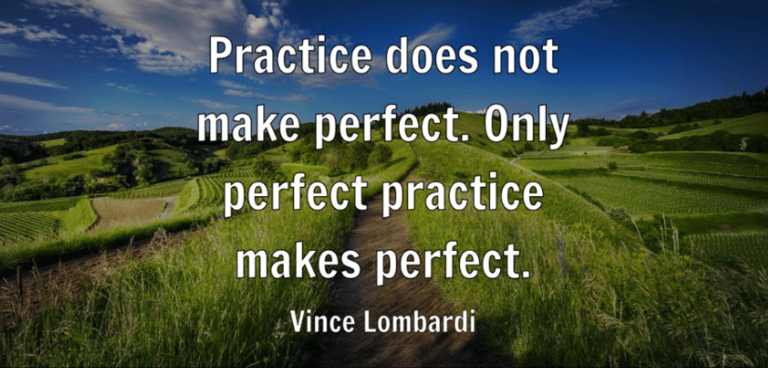

This is Vince Lombardi’s famous quote.
He refined the original “practice makes perfect” quote to create this unique version.
Great, right? Yes.
If you use this new version, you must acknowledge Lombardi.
Finally, if you’re still unsure whether to cite a source or not, it’s safer to cite to avoid unintentional plagiarism.
Subscribe to my newsletter!
Is it okay to cite Wikipedia as a source?
Wikipedia has a wealth of information.
But citing it is generally not recommended in formal writing because:
It’s not a primary source of information.
Anyone (literally anybody) can edit the articles there.
And the information in the articles can change overnight.
This makes Wikipedia less reliable.
In fact, Wikipedia itself advises that nothing found on the site “has necessarily been reviewed by people with the expertise required to provide you with complete, accurate, or reliable information.”
Here’s Wikipedia’s General Disclaimer:
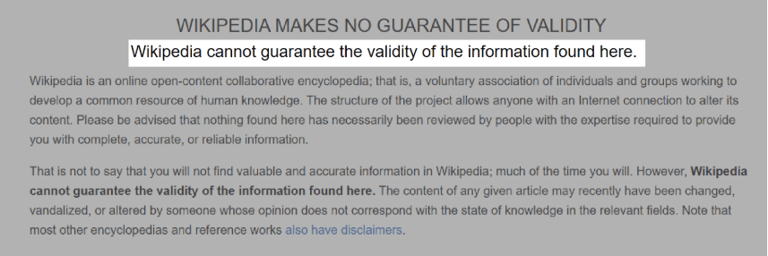

So, it’s not okay to cite Wikipedia as a source in your writing.
However, Wikipedia can still be useful in some contexts:
In doing background research
And in informal writing.
I. Background research
You can use Wikipedia as a starting point for your research to:
Get a general understanding of a topic
Find initial ideas
Or identify reputable sources linked in the references.
This way, you get access to more trustworthy and accurate sources for your writing.
II. Casual or informal writing
In blog posts or informal content, citing Wikipedia is sometimes acceptable.
But this is especially true if:
The topic is not controversial or serious
Or your audience is looking for general information.
Otherwise, don’t cite Wikipedia as a source.
